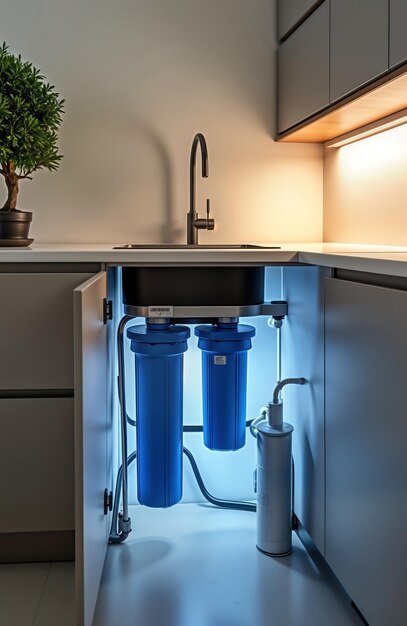What Are Whole House Water Filters?
Whole house water filters are an effective solution to ensure that every tap in your home provides clean and safe water. Unlike single-faucet filters that only purify water at one point, these systems filter all the water coming into your home from a single location, usually where your water line enters the house. This means your showers, sinks, laundry, and even your appliances will benefit from cleaner, healthier water. But if you’re using well water, understanding the importance of water treatment and how whole house filters work is even more crucial.
So, whether you’re looking to improve the quality of municipal water or need well water treatment, understanding the features and benefits of a whole house water filter can be life-changing.
Why Should You Consider a Whole House Water Filter?
When you have access to safe and clean water, it’s easy to take it for granted. But over time, contaminants like chlorine, bacteria, sediment, and minerals can make their way into your water supply. If you’re on a well water system, these contaminants could be even more challenging to manage, as the water source may not be treated by local authorities.
Here’s why investing in a whole house water filter can be beneficial:
Protects your health: A whole house water filter removes harmful bacteria, pesticides, heavy metals, and chlorine, which are common in both municipal and well water. This reduces your exposure to contaminants, helping you maintain better health.
Improves taste and odor: If you’ve noticed a strange taste or smell in your water, a filter will help eliminate the cause, whether it’s sulfur from well water or the chlorine added by municipal treatment plants.
Preserves plumbing and appliances: Hard water, often present in well water, can cause scale buildup in your pipes and appliances like water heaters and dishwashers. A filter system can help prevent this, saving you money on repairs and replacements.
Convenience: With a whole house filter, you get clean water from every tap without having to worry about replacing pitcher filters or remembering to attach a filter to each faucet.
Well Water Treatment – What’s Different?
If you’re relying on well water, you might already know that it’s not always as clean as you’d expect. While it’s naturally sourced, it can contain higher levels of iron, manganese, bacteria, and other harmful elements that affect the water quality. A well water treatment system is critical because local authorities do not treat or monitor your well water supply.
Here’s what makes well water treatment important:
Iron and manganese: These minerals can cause staining in toilets, tubs, and laundry. They can also clog pipes and damage appliances.
Bacteria and viruses: Well water is more likely to contain harmful microorganisms that can lead to gastrointestinal issues or infections.
Hard water: Many wells have high levels of calcium and magnesium, causing mineral buildup in pipes and appliances.
For well water treatment, a whole house water filter specifically designed to treat these issues can help improve both the quality and safety of your water.
Key Features to Look for in Whole House Water Filters
When choosing a whole house water filter, there are a few features that can make a big difference, especially if you’re treating well water:
Filtration capacity: Make sure the system can handle the size of your household. A higher capacity filter is essential for larger homes or if you use more water daily.
Multi-stage filtration: These filters often include several stages of filtration, such as sediment removal, activated carbon, and mineral filtration. This ensures that you remove various contaminants, including chlorine, sediment, heavy metals, and even bacteria.
UV light: Some whole house water filters include UV light treatment to kill bacteria and viruses. This is especially important for well water that could harbor harmful microorganisms.
Sediment filters: Well water is often full of debris, so a sediment filter helps remove particles that could clog the system or affect water quality.
Water softener: If you have hard water, look for a filter that also softens your water, reducing the mineral content that can damage plumbing and appliances.
How to Install a Whole House Water Filter
Installing a whole house water filter is typically a job for a professional, especially if you have well water. However, here’s a general overview of the installation process:
Locate the water line entry: Your filter should be installed where the water line enters your home. This ensures that all water is filtered before reaching any taps or appliances.
Turn off the water supply: Before installing the filter, shut off the water supply to your home. This will prevent leaks or other issues during installation.
Connect the filter: The filter is connected to the water line using plumbing tools. This might involve cutting and fitting pipes, and the system will need to be tested to ensure proper water flow.
Regular maintenance: After installation, be sure to maintain your filter by replacing the filters according to the manufacturer’s guidelines. This helps ensure the system continues to work effectively.
Tips for Maintaining Your Whole House Water Filter
Maintaining your whole house water filter will extend its lifespan and ensure that your water quality stays optimal:
Regularly replace filters: Check the manufacturer’s recommendations for when to replace the filter cartridges. Depending on usage, this could be every 6 months or up to a year.
Test your water: If you use well water, periodically test your water quality for common contaminants like bacteria, nitrates, and heavy metals. This will help you understand whether the filter is still performing well.
Clean the system: Some filters may need to be cleaned to remove mineral buildup, especially in areas with hard water. Always follow the manufacturer’s instructions for cleaning.
Inspect for leaks: Periodically check the system for leaks or blockages. Catching issues early can prevent costly repairs.
Conclusion: Is a Whole House Water Filter Worth It?
If you’re looking to improve the quality of water in your home, a whole house water filter is a smart investment. For those with well water, it’s even more critical to have a system that handles bacteria, minerals, and sediment. With the right system in place, you can ensure that every drop of water you use is clean, safe, and free from contaminants, making it easier to stay healthy and keep your home in good condition.
Whether you’re concerned about the health of your family, the longevity of your appliances, or the quality of your water, well water treatment and a whole house filter can make a significant difference.



